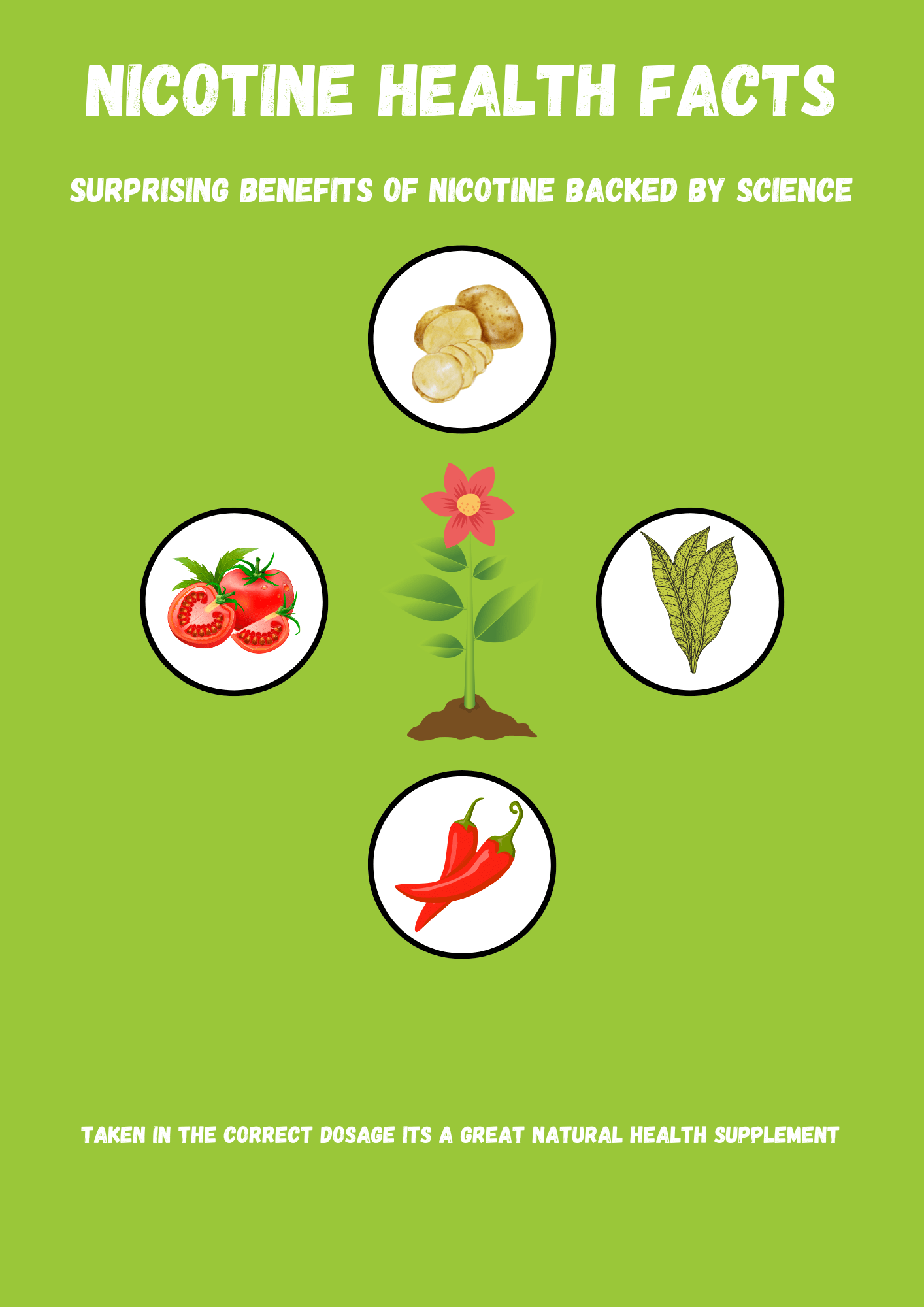
Introduction: Rethinking Nicotine
Nicotine benefits. Nicotine often carries a negative reputation due to its association with smoking but there are some amazing health benefits from nicotine that can be really good for us, Scientific research suggests that this naturally occurring compound may offer several benefits when used responsibly, Many plants, vegetables, herbs, and spices contain nicotine in trace amounts, making it a natural part of the human diet.
This article explores the medical data that’s scientifically supported advantages of nicotine, its sources in nature, and its potential role in cognitive enhancement, mental health, and overall well-being.
Health Facts What Is Nicotine?
Nicotine is an alkaloid found in the nightshade family of plants, including tobacco, tomatoes, potatoes, and aubergines, While tobacco contains the highest concentration, other plant-based foods contribute small but measurable amounts of nicotine to the human diet.
This compound interacts with the nervous system, influencing neurotransmitters such as dopamine and acetylcholine.
Nicotine and the Brain: Cognitive Benefits
The health facts show that nicotine has a direct impact on brain function. Scientific studies highlight its role in enhancing cognitive abilities, improving focus, and potentially protecting against neurodegenerative conditions.
1. Improved Focus and Concentration
Health facts-research shows that nicotine enhances cognitive performance by stimulating neurotransmitters linked to alertness and attention, A study published in Psychopharmacology found that nicotine users demonstrated better reaction times and working memory compared to non-users.
2. Neuroprotection Against Diseases
Nicotine’s interaction with acetylcholine receptors helps maintain cognitive function, Studies indicate a lower risk of Alzheimer’s and Parkinson’s disease among individuals who have a good amount of natural nicotine intake daily.
The stimulation of dopamine production reduces neurodegeneration, which plays a role in these conditions.
3. Enhanced Memory Retention
Health facts-Short-term memory sees noticeable improvements with nicotine consumption, A report in Frontiers in Pharmacology discovered that controlled nicotine doses enhance verbal recall and learning capabilities in non-smokers.
Health facts-Nicotine and Mental Health: A Potential Mood Booster
Beyond cognitive benefits, nicotine exhibits positive effects on mental health, This compound acts as a mild stimulant and can elevate mood, reducing symptoms of depression and anxiety.
1. Reduced Symptoms of Depression
Health facts shows that Dopamine and serotonin regulation play a crucial role in mood disorders, Since nicotine increases dopamine levels, it can lead to improved mood and motivation, Research suggests that nicotine therapy may assist individuals with treatment-resistant depression.
2. Lower Anxiety Levels
Nicotine, in low doses, has a calming effect. It helps regulate stress hormones, which can contribute to reduced anxiety in some individuals medical research as found.
A Biological Psychiatry study concluded that nicotine patches lessened anxiety symptoms in non-smokers facing stress-related conditions.
3. Potential ADHD Benefits
Health facts shows individuals with Attention Deficit Hyperactivity Disorder (ADHD) struggle with focus and impulse control, Some studies have shown that nicotine can mimic certain ADHD medications by increasing dopamine levels, leading to better concentration.
Surely this as to be a good thing getting away from highly addictive pharmaceutical medication that damages human organs and also causes other none related problems.
Natural Sources of Nicotine in Food
Nicotine naturally occurs in a variety of plants, including commonly consumed vegetables and spices, These sources contain small amounts that do not induce addiction but may still offer mild cognitive benefits.
Vegetables That Contain Nicotine
- Tomatoes – Ripe tomatoes contain nicotine in low concentrations. The levels increase as they mature.
- Potatoes – Especially in green potatoes, small traces of nicotine contribute to natural alkaloid content.
- Aubergines (Eggplants) – Among non-tobacco sources, aubergines have one of the highest nicotine concentrations.
- Peppers – Both green and red peppers contain traces of nicotine, though in minimal amounts.
Herbs and Spices Containing Nicotine
- Celery – A mild source, contributing to natural nicotine intake.
- Cauliflower – Contains small but measurable amounts.
- Black Tea – Though its nicotine levels are relatively low, tea leaves contribute to dietary nicotine intake.
Nicotine as Boosting Effects of in Controlled Use
While high doses of nicotine can be harmful, moderate and controlled intake may support various health aspects when taken in the correct dosage.
1. Enhanced Weight Management
Health facts-Nicotine has appetite-suppressing effects. Some studies suggest that it boosts metabolism and helps individuals regulate food intake, making it a potential aid for weight management.
2. Increased Physical Endurance
Athletes may experience improved endurance due to nicotine’s stimulant properties, It enhances oxygen uptake and circulation, leading to better performance in certain physical activities.
3. Improved Gut Health
Nicotine has been linked to anti-inflammatory effects in the digestive system, Some researchers believe it may help manage conditions such as ulcerative colitis and Crohn’s disease by reducing inflammation in the gut.
Debunking Myths: Separating Nicotine from Smoking
A common misconception is that nicotine alone is responsible for the health risks associated with smoking, However tobacco smoke contains thousands of harmful chemicals including tar and carbon monoxide, which cause major health issues.
1. Is Nicotine Addictive on Its Own?
Nicotine can be habit-forming, but addiction often arises due to the combination of nicotine and other compounds in cigarettes, Pure nicotine, as found in certain foods and medicinal products, does not carry the same addictive risk as tobacco use.
2. Is Nicotine Harmful Without Tobacco?
Nicotine when separated from harmful smoking-related chemicals, does not cause severe health damage, Research suggests that its effects on the cardiovascular system are mild when compared to the impact of smoking.
How to Incorporate Nicotine Naturally and Safely
Those looking to benefit from nicotine without tobacco exposure have various options, Have a look at a few of them below.
1. Diet-Based Nicotine Intake
Consuming nicotine-rich vegetables and herbs can provide mild stimulation without the risks associated with smoking.
2. Nicotine Replacement Therapy (NRT)
For individuals interested in controlled nicotine intake, patches, lozenges, and gum offer safer alternatives. These methods avoid harmful toxins present in cigarettes.
3. Mindful Consumption
Understanding individual tolerance is key, Small doses from dietary sources or regulated products can provide cognitive and mood benefits without significant risks.
Conclusion: A New Perspective on Nicotine
Health facts have shown how nicotine as been totally misunderstood, Smoking tobacco is harmful, controlled nicotine intake offers scientifically backed benefits, including cognitive enhancement, mental health improvements, and metabolic regulation.
Many common vegetables, herbs, and teas contain small amounts of nicotine, contributing to dietary intake without negative consequences as we mentioned earlier in the article, With emerging research shedding light on nicotine’s potential advantages, it is time to reconsider its role beyond the realm of smoking.
Responsible use, whether through diet or therapeutic applications, may unlock a range of health benefits for those who understand and respect this powerful compound.
We hope you found this article of interest and ask you to take a look at some other informative posts we have put together throughout the site.
Well-being nutrition for daily greens





